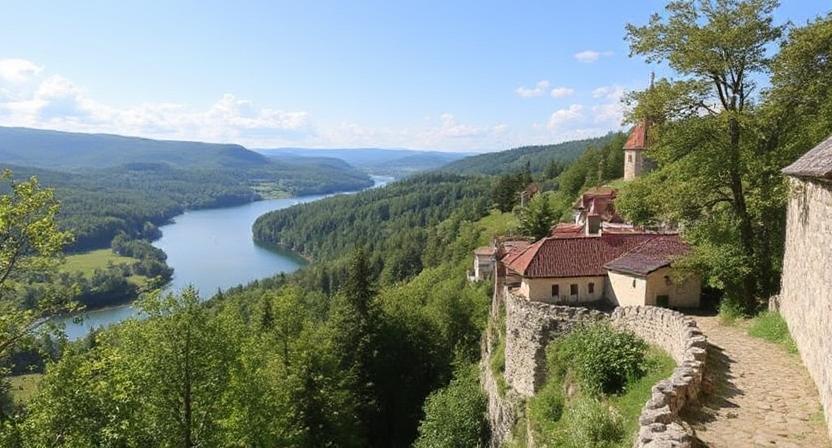Published on
October 8, 2025
The Destination of Sustainable Cultural Tourism Awards, organized every year by leading institutions such as the European Travel Commission (ETC) and the European Cultural Tourism Network (ECTN), have become the standard for sustainable tourism in Europe. The 2025 event, organized in Sibiu, Romania, was a celebration of the finest innovations in culturally promoting tourism, eco-tourism, and heritage conservation on the continent. This year’s forum placed particular stress on developing tourism models based on balance between growth and responsibility, where local cultures and natural environments are preserved while tourism flourishes.
Key Themes of the 2025 Awards: Sustainability, Smart Tourism, and Cultural Heritage
The awards focused on the theme “Visitor Experiences and Authenticity for Sustainable, Smart, and Resilient Cultural Tourism Destinations”, highlighting the evolving role of digitalization and smart tourism technologies in enhancing visitor experiences. Winners were selected for their ability to blend authentic cultural experiences with sustainable practices, leveraging innovative solutions to improve the tourism experience while ensuring the preservation of cultural heritage.
Resilience in Sustainable Cultural Tourism: Leading Examples of Community and Heritage Preservation
The Resilience in Sustainable Cultural Tourism Destinations category showcased initiatives that prioritize community engagement and heritage preservation. The Transylvanian Highlands project in Romania received the first prize for its efforts to promote responsible tourism that fosters community resilience while preserving the Saxon Cultural Landscape. Other notable entries included DescOpera Festival in Moldova, a model for sustainable cultural tourism, and Krka National Park in Croatia, which combines natural beauty with sustainable tourism practices.
Wine and Gastronomy Tourism: A Delicious Journey of Local Flavors and Culinary Traditions
Wine and gastronomy tourism has become a central part of cultural tourism, as it allows visitors to engage with the culinary heritage of a region. The Tasty Tartu festival in Estonia won first prize for its innovative approach to food tourism by offering a month-long celebration of regional flavors and promoting off-season travel. Other winners, like Tiramisù World Cup in Italy, and Vrsar Amareti in Croatia, emphasized the importance of preserving local food traditions while attracting international tourists through unique culinary experiences.
Digitalization in Smart Tourism: Enhancing Visitor Engagement through Technology
In the Digitalization in Smart Tourism category, projects that leverage technology to enhance visitor experiences were celebrated. The Time Travel project from Portugal won first place for its use of augmented reality to create interactive, immersive experiences. In Romania, the Biertan Audio Quest and Sibiu’s Digital Heritage Preservation were also recognized for their efforts to digitally engage visitors with the region’s rich cultural history. These projects underscore the potential for technology to drive innovation in cultural tourism, making it more accessible, interactive, and educational.
Transnational Thematic Tourism Products: Strengthening Cultural Routes Across Europe
The Transnational Thematic Tourism Products category recognized initiatives that connect cultural destinations across national borders. The European Route of Historic Gardens received the top award for its effort to create a pan-European cultural route that links gardens and historic landscapes across multiple countries. This project fosters a shared appreciation for Europe’s horticultural heritage while promoting cross-border tourism. The People’s Portal Dublin and Via Dinarica: Green Trail projects were also recognized for their innovative approach to connecting people and cultures through transnational tourism routes.
Cultural Tourism Services for All: Inclusive, Authentic, and Accessible Tourism
The Cultural Tourism Services for All category recognized initiatives that make cultural tourism accessible to everyone, regardless of background or physical ability. The Living Heritage for All project in Cyprus won first place for its efforts to revitalize rural museums and offer inclusive and sustainable cultural experiences. Other winners in this category, like Via Transilvanica in Romania and LUV FEST in Slovenia, demonstrated how cultural tourism can be used to build more inclusive and community-focused tourism experiences.
Greece and Peru: Collaborating on Sustainable Cultural Tourism
Aligned with the sustainable tourism focus of the awards, Greece and Peru are working together to enhance cultural tourism in their respective countries. Through their Joint Action Program, the two nations are committed to preserving cultural heritage and promoting sustainable travel experiences. This partnership emphasizes the value of cultural exchange and sustainable development, with both countries showcasing their unique histories, landscapes, and culinary traditions to attract international tourists.
The Role of Cultural Tourism in Boosting Local Economies and Global Profiles
Cultural tourism has proven to be a powerful tool for economic development, particularly in smaller towns and rural areas. By promoting local culture, history, and traditional crafts, regions are able to boost local economies, create job opportunities, and enhance their global tourism profile. The award-winning projects from Cyprus, Romania, Slovenia, and Estonia all demonstrated how cultural tourism can stimulate local economies while preserving the identity of a destination.
The Future of Sustainable Cultural Tourism: Innovations and Opportunities
Looking ahead, sustainable cultural tourism will continue to play a crucial role in shaping the future of the global tourism industry. As more travelers seek authentic and responsible travel experiences, the demand for destinations that offer sustainable practices and cultural immersion will increase. The 2025 Destination of Sustainable Cultural Tourism Awards serve as a model for how destinations can develop and promote eco-tourism, cultural tourism, and community-based initiatives while ensuring long-term sustainability and heritage preservation.
A Bright Future for Sustainable Cultural Tourism in Europe
The Sustainable Cultural Tourism Awards 2025 bring to the fore the increasing relevance of sustainability to the tourism industry. The successful destinations prove that cultural heritage, sustainable tourism, and innovative solutions can go hand-in-hand with each other to produce a vibrant tourism industry. As the old continent continues to forge ahead in sustainable tourism, such initiatives provide useful lessons for nations from across the globe wishing to marry heritage conservation with tourism growth.
